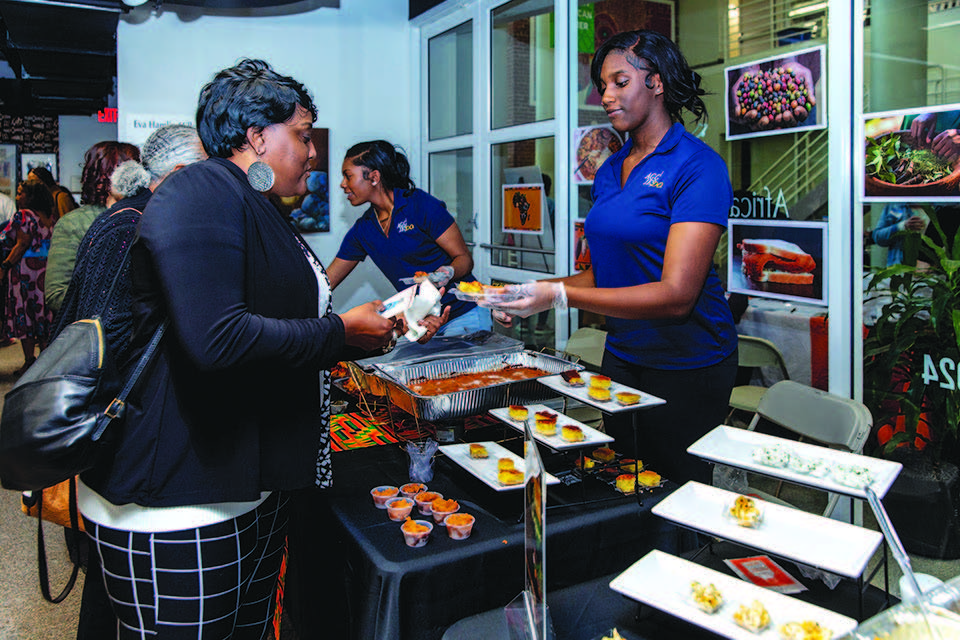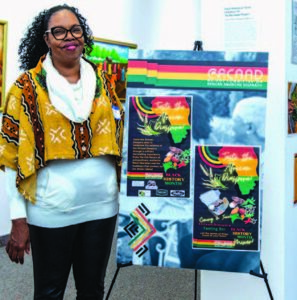Culture and Food ‘Mix It Up’ at the African American Atelier
By Yasmine Regester, Peacemaker Staff Writer / March 1, 2024
Event attendees sample an assortment of foods. Photo by Ivan Saul Cutler/Carolina Peacemaker.
In a vibrant celebration of history and flavors, The City of Greensboro’s Ad-hoc Committee on African American Disparity (ACAAD) honored Black History Month with a free community mixer on February 22 at the African American Atelier, located in the Cultural Arts Center.
Themed ‘Taste the Diaspora GSO,’ this event sought to connect guests with ACAAD commissioners and educate them about the eating habits and culinary practices of the African diaspora in America. A collective of local Black chefs, restaurants, and farmers were invited to prepare diaspora-themed dishes for guests to sample.
Since the establishment of the ACAAD in 2020, the group has been working to address barriers that prevent success for African American residents in Greensboro through policies, procedures, and regulations. Through research on policy and procedures, and community feedback, committee members are responsible for making recommendations to the city council regarding ways to improve access to resources for the city’s African American population. Committee members serve two-year terms. The ACAAD hosts two community engagement events a year, one during Black History Month and one in June for Juneteenth.

B. Michelle Lucas, a member of the Greensboro Ad Hoc Committee on African American Disparity. Photo by Ivan Saul Cutler/Carolina Peacemaker.
Committee Chair, Crystal Black, noted that the mixer addressed two areas of focus: education through the history of traditional foods and the economic development piece by inviting local Black restaurateurs to share their food.
“The idea is to reconnect our community with the food and with how Black foods traveled. We look at the African American diaspora and a lot of our foods started in African, traveled to the Caribbean, and then landed in America. A lot of those foods sitting on our tables every holiday, came out of the Trans-Atlantic Slave Trade. This was a chance to be able to talk about how black eye peas made it to America from Africa, and why it is so important for it to be on our tables,” said Black.
Featured restaurants included: TK Congo, an African restaurant, Paradise Restaurant, a Jamaican/Caribbean restaurant, and soul food restaurants, Ben’s Boyz, My Girls Catering, and Butler’s Catering. They supplied a variety of foods including cassava leaf, fufu, jerk chicken, and Hoppin’ John, which is widely described as a more traditional recipe for black eye peas, slow cooked with smoked meat and vegetables.
Attendees not only had the opportunity to savor diverse food offerings, but were also invited to immerse themselves in the African American Atelier’s art exhibit. This exhibit intricately traced the culinary journey of African Americans, spotlighting beloved classics like yams, greens, fried chicken, and macaroni and cheese.
“We also wanted people to learn in the process. Why do we consume certain foods, why we love greens, why we love macaroni and cheese. There’s a story behind everything that we call soul food,” said Black. “It shows how those things were introduced to us and why they became so important.”
Liz Lennon, Commissions Administrator for the Greensboro Human Rights Department noted how the journey of African American foods expands beyond eating, but also explores the deep economic and cultural impact Black restaurants have made when they open and serve these foods.
“We wanted to educate people on what these foods really mean beyond us making do with what we had. These foods and passed down recipes are how people make a living and take care of their families,” said Lennon.
More information on the ad-hoc committee can be found under the City of Greensboro Human Rights Department at www.greensboro-nc.gov.







